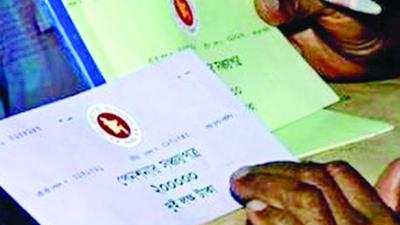 In its desperate move to address the liquidity crisis, private banks now are moving the administration to revise down the interest rates for government-offered saving schemes.
In its desperate move to address the liquidity crisis, private banks now are moving the administration to revise down the interest rates for government-offered saving schemes.
The Bangladesh Association of Banks (BAB) it will ease the liquidity crisis and gradually decrease the double-digit lending rate.
The BAB has written to Finance Minister AMA Muhith, who told a pre-budget discussion earlier this month that the rates will be revised after the budget for the upcoming fiscal is announced.
“We as well as the government is trying to bring down the interest rate to single digit. We have taken several initiatives for the sake of the economy. We also want to utilise idle funds in state-owned banks,” BAB President and Exim Bank Chairman Nazrul Islam Majumder told the Bangla Tribune.
In its negotiation earlier this year to slash the lending rate, private banks managed the Bangladesh Bank to reduce the cash reserve ratio (CRR) by one percentage point to 5 percent, extend the deadline for adjusting ADR that measures loans as the percentage of deposits and lower the repo rate from 6.75 percent to 6 percent.
The repo interest rate determines the rate of interest a commercial bank has to pay on a loan from the Bangladesh Bank.
It had also made the government to keep 50 percent of its funds with them in an effort to address the liquidity crisis.
Despite the stimulus, lending rates are yet to come down to a single digit, rather it went up.
According to Bangladesh Bank data, all banks— state, private and foreign have hiked rate is March. All of the 57 banks are now maintaining a double-digit rate with industrial loans charged as high as 22 percent.
According to sources, the central bank in a letter to the finance ministry blamed the high interest rate of saving certificates for jeopardizing the financial sector.
The government borrowing from savings certificates has exceeded its target by 10 percent in the first eight months of the current fiscal year.
According to the latest data from the Department of National Savings, savings certificates worth Tk 538.32 billion were sold between July to February of the fiscal year (FY) 2017-18, an increase of 14.22 percent over the same period a year ago.
The government paid Tk 207.12 billion as interest on its previous borrowing, making the government’s net borrowing valued Tk 331.20 billion. This is 10 percent higher than its borrowing target of Tk 301.5 billion from savings instruments in the present budget.
A volatile capital market and fall in banking interest have encouraged people to invest in the savings certificates. Even the recent increase in interest rates at several banks has not slowed down the sales of savings certificates.
The interest rates of savings certificates were cut for the last time in 2015 by an average 2 percent to rein in sales.
Muhith had wanted last year to cut the rates in the budget for the ongoing financial year, but had backed off following criticisms.
Sources at the National Board of Revenue said they have suggested revising the rates down by an average 2 percent.
Analysts, however, say cut in the rate in saving schemes does not ensure that banks will be able to attract deposits.
“The government-offered saving schemes also act as a kind of social security scheme. People will always opt profit in secured investment,” former caretaker government adviser AB Mirza Azizul Islam told Bangla Tribune.
He said the government needs to consider the scenario of the fixed income groups before cutting the rates.
 Business
Business
41058 hour(s) 20 minute(s) ago ;
Afternoon 01:15 ; Monday ; Jun 23, 2025
Banks want cut in savings certificate rate
Send
Golam Mowla
Published : 08:00, May 21, 2018 | Updated : 08:00, May 21, 2018
Published : 08:00, May 21, 2018 | Updated : 08:00, May 21, 2018
0 ...0 ...
/zmi
Topics: Top Stories
- KOICA donates medical supplies to BSMMU
- 5 more flights to take back British nationals to London
- Covid19: Rajarbagh, Mohammadpur worst affected
- Momen joins UN solidarity song over COVID-19 combat
- Covid-19: OIC to hold special meeting
- WFP begins food distribution in Cox’s Bazar
- WFP begins food distribution in Cox’s Bazar
- 290 return home to Australia
- Third charter flight for US citizens to return home
- Dhaka proposes to postpone D8 Summit
Unauthorized use of news, image, information, etc published by Bangla Tribune is punishable by copyright law. Appropriate legal steps will be taken by the management against any person or body that infringes those laws.
Bangla Tribune is one of the most revered online newspapers in Bangladesh, due to its reputation of neutral coverage and incisive analysis.
F R Tower, 8/C Panthapath, Shukrabad, Dhaka-1207 | Phone: 58151324; 58151326, Fax: 58151329 | Mob: 01730794527, 01730794528






